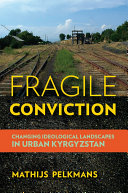Author
Cookson; Michael ; Braithwaite; John ; Dunn; Leah ; Braithwaite; Valerie
Year
2010
Publisher
ANU Press
Type
BOOK
Category
Conflict management
Language
English
Pages
501
ISBN
978-1-92166-622-3
Last Update
01-Nov-2024
Keywords
Peace & Conflict Studies ; security-studies-discipline ; Political Science ; Asian Studies
Related
See More
Episches Erzählen bei Goethe als Reflexion auf moderne Zeitlichkeit

Familia y vida privada en la historia de Iberoamérica

Fragile Conviction

Decolonizing Native Histories

Building a National Literature

Drama, Poetry and Music in Late-Renaissance Italy